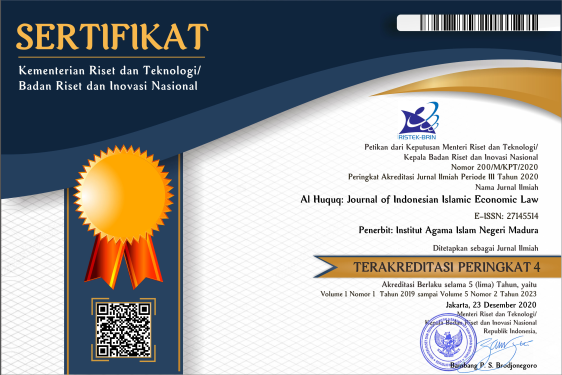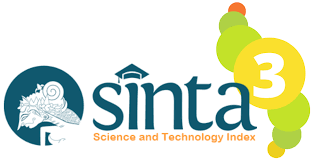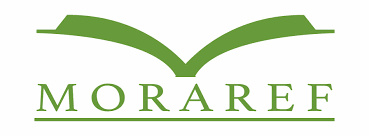The Environmental Impact Analysis of the Scrap Iron Cutting Industry in Kamal-Bangkalan Regency: A Sharia Economic Law Perspective
 Abstract views: 200
,
Abstract views: 200
,
 PDF downloads: 257
PDF downloads: 257
Abstract
The sunken or damaged ships cutting scrap metal business in Tanjung Jati Kamal Village, Bangkalan, Madura, has sparked controversy among local residents. Ship dismantling is performed by using heavy machinery which generates dense smoke that affects the ecosystem and poses health risks to the local community. This research aims to assess the severity of the negative consequences of environmental pollution and to investigate the extent to which existing regulations govern the pollution generated. To enhance the study, it examines the principles of sharia economics to determine if these economic activities align with sound economic principles. Utilizing empirical legal research methods, this study relies on primary data obtained directly from the research site through interviews with local residents, workers, and teachers in the vicinity of the industry. Additionally, secondary data is gathered from credible news sources, books, and scientific journals concerning scrap metal cutting activities. The findings indicate that scrap metal cutting contributes to environmental pollution and adversely affects public health, particularly the children. While relevant regulations exist, there is a need for enforcement and more specific law to regulate the standard operating procedures for scrap metal cutters. Moreover, the practice does not align well with the principles of sharia economic law.
Downloads
References
Alfarizi, Farid. “Wawancara Langsung (Guru Pendidikan Jasmani Olahraga).” 2023.
Bangkalan, Kabupaten. Peraturan Daerah kabupaten Bangkalan Nomor 10 tahun 2009 Tentang Tata Ruang Wilayah Kabupaten Bangkalan Tahun 2009-2029, Pub. L. No. 10 (2009).
Faizal, Bhismoadi Tri Wahyu. “Hukum Bisnis Perspektif Islam Dan Kapitalis (Tinjauan Teoritis Atas Aktivitas Bisnis Di Indonesia).” Al-Huquq: Journal of Indonesian Islamic Economic Law 3, no. 2 (December 16, 2021): 143–62. https://doi.org/10.19105/alhuquq.v3i2.5218.
Garmabrata, Galuh. “Sigi: Petaka Bisnis Kapal Rongsokan.” Liputan6.com, 2018.
Haikal, Mohammad, and Sumardi Efendi. “Prinsip-Prinsip Hukum Ekonomi Syariah Dalam Undang-Undang Perbankan Syariah.” MAQASIDI: Jurnal Syariah Dan Hukum, no. 13 (2024): 26–39. https://doi.org/10.47498/maqasidi.v4i1.2988.
Indonesia, Republik. Undang-undang (UU) Nomor 32 Tahun 2009 tentang Perlindungan dan Pengelolaan Lingkungan Hidup, Pub. L. No. 32 (2009).
Kholid Muhammad. “Prinsip-Prinsip Hukum Ekonomi Syariah Dalam Undang-Undang Tentang Perbankan Syariah.” Asy-Syariah, 2018.
Pratiwi, Dinda Pratiwi, and Dian Ayu Larasati. “ANALISIS DAMPAK PENGOLAHAN BESI TUA TERHADAP LINGKUNGAN DI DESA TANJUNG JATI MADURA.” Swara Bhumi 1, no. 1 (2022).
Regia, Rinda Andhita, and Katharina Oginawati. “POTENSI BAHAYA DEBU SILIKA TERHADAP KESEHATAN PANDAI BESI DESA MEKARMAJU KABUPATEN BANDUNG.” Jurnal Dampak, 2017. https://doi.org/10.25077/dampak.14.2.73-80.2017.
Sholeh, Aftina Fityan. “Adaptasi Pedagang Besi Tua Suku Bangsa Madura Di Kota Surabaya.” Biokultur, 2020.
Soerjono Soekanto. Pengantar Metode Penelitian Hukum. Jakarta: FH UI Press, 1982.
Timur, Provinsi Jawa. Peraturan Daerah (Perda) Provinsi Jawa Timur Nomor 1 Tahun 2018 tentang Rencana Zonasi Wilayah Pesisir dan Pupau-pulau kecil Provinsi Jawa Timur Tahun 2018-2038, Pub. L. No. 18 (2018).
Copyright (c) 2024 Al-Huquq: Journal of Indonesian Islamic Economic Law

This work is licensed under a Creative Commons Attribution-ShareAlike 4.0 International License.















